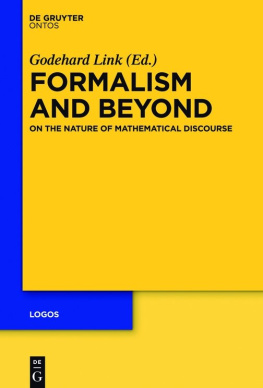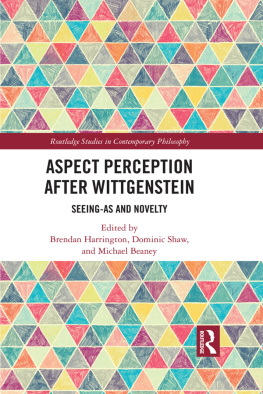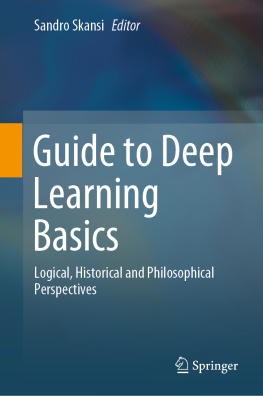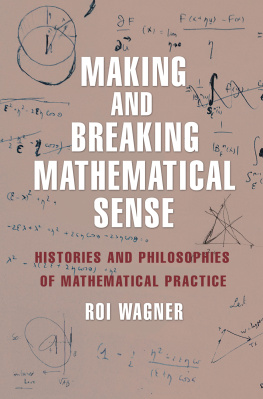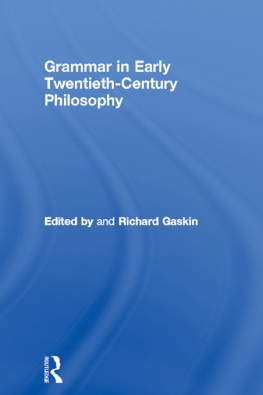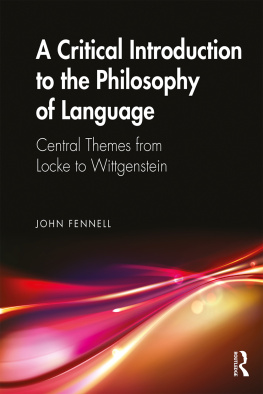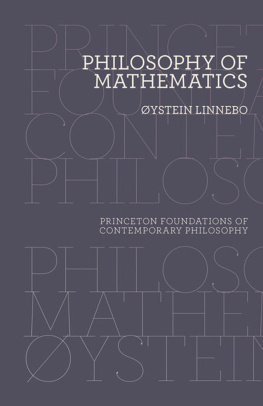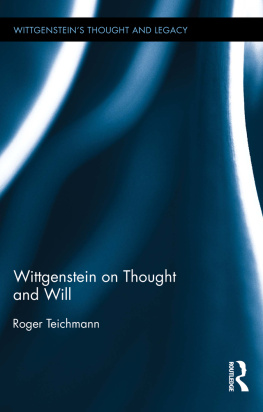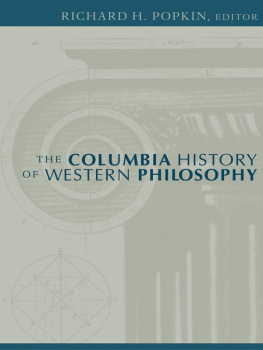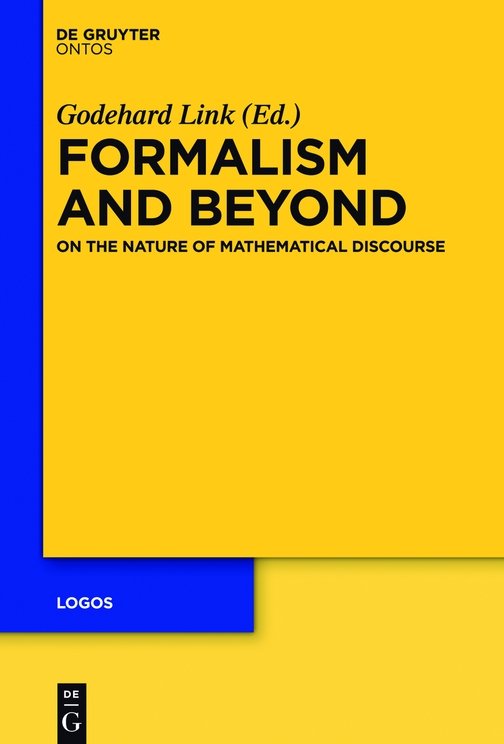List of Contributors
Andrew Arana is associate professor of philosophy and mathematics at the University of Illinois at Urbana-Champaign. He works in logic and the history and philosophy of mathematics, with particular interest in the interactions between different areas of mathematics such as geometry and algebra, and the role of language in mediating such interactions.
Patricia Blanchette is Professor of Philosophy at the University of Notre Dame. Her research centers on the history and philosophy of logic and mathematics, and the history of analytic philosophy. Recent work includes Freges Conception of Logic , Oxford University Press 2012.
Laura Crosilla is Teaching Assistant in the Philosophy Department at the University of Leeds. She has worked on the proof theory of constructive set theory and of operational constructive set theory, applications of constructive set theory to constructive mathematics and the theorem prover Minlog. She is currently working on the philosophy of constructive mathematics.
Michael Detlefsen is McMahon-Hank Professor of Philosophy at the University of Notre Dame and long time editor of the Notre Dame Journal of Formal Logic . He has published on a variety of topics in logic and the history and philosophy of mathematics. Recently, his special interest has been meaningful points of connection with philosophy in the history of mathematics.
Godehard Link is a retired professor of logic and philosophy of science at the University of Munich. He is a member of the Munich Center for Mathematical Philosophy (MCMP). His research interests include Logic, Philosophy of Mathematics, Russell Studies, Logic and Semantics of Natural Language, Formal Ontology, Foundations of Probability. He served as the speaker of the German group of the TransCoop project.
Felix Mhlhlzer is Professor of Philosophy at the Georg-August University Gttingen and has written mainly on subjects in the philosophy of science and on Wittgenstein, especially Wittgensteins philosophy of mathematics. His publications include Braucht die Mathematik eine Grundlegung? Ein Kommentar des Teils III von Wittgensteins BEMERKUNGEN BER DIE GRUNDLAGEN DER MATHEMATIK (Klostermann, 2010) and Wissenschaft (Reclam, 2011).
Karl-Georg Niebergall is Professor for Logic and Philosophy of Language at the Humboldt University Berlin. He studied Logic and Philosophy of Science, Mathematics, Physics and Philosophy at the TH Darmstadt and at LMU Munich. He received his doctorate in Philosophy, and his Habilitation in Philosophy, and Logic and Philosophy of Science at LMU. In 1997 he was a visiting scholar at Stanford University. His main areas of research are: logic, philosophy of language, ontology, and philosophy of science.
Marek Polaski studied philosophy at Adam Miciewicz University in Poznan and logic and philosophy at LMU Munich where he received his PhD in Logic and the Methodology of Science from LMU Munich. His areas of interest and specialization include modal logic (especially epistemic logic and counterpart semantics), philosophy of language, and model theory and its applications in analytic philosophy. He is associated with the LMU in Munich and the Humboldt University in Berlin.
Daniel Roth is Lehrbeauftragter in Logic and Philosophy of Mathematics at the University of Munich and member of the Munich Center for Mathematical Philosophy. He also teaches mathematics at a secondary school in Munich.
Matthias Schirn is retired professor of Philosophy at the University of Munich and a member of the Munich Center for Mathematical Philosophy. His research interests are in the philosophy of logic and mathematics, the philosophy of language, intensional semantics, epistemology and the philosophical and logical theories of Frege, Russell, Wittgenstein and Hilbert. He published numerous articles in international journals and held visiting positions at the universities of Oxford, Cambridge, Harvard, Berkeley, Minnesota (Twin Cities), Rio de Janeiro (UFRJ), So Paulo (PUC-SP), Campinas (UNICAMP), Mexico (UNAM, IIF), Buenos Aires (National University) and other universities in Europe and North and South America.
Gregor Schneider is a mathematician and philosopher and a member of the Munich Center for Mathematical Philosophy. He works in the history and philosophy of mathematics and has special interest in modern and ancient foundations of mathematics.
Peter Schuster is Lecturer in Mathematical Logic at the University of Leeds. His contributions include reverse and choice-free mathematics, formal topology, and constructive set theory. In 2008 the Humboldt Foundation had awarded him a Feodor Lynen Research Fellowship.
Paul Ziche holds a chair for the history of modern philosophy at Utrecht University, The Netherlands; his research topics include: history of philosophy with a focus on the periods around 1800 and 1900; German Idealism; the interaction between philosophy and the sciences; history of psychology; alternative lines in the history of logic, with a focus on the period around 1900.
Duality, Epistemic Efficiency & Consistency
Michael Detlefsen
Duality has often been described as a means of extending our knowledge with a minimal additional outlay of investigative resources. I attempt to construct a serious argument for this view. Certain major elements of this argument are then considered at length. Theyre found to be out of keeping with certain widely held views concerning the nature of axiomatic theories (both in projective geometry and elsewhere). Theyre also found to require a special form of consistency requirement.
1 Introduction
Duality or reciprocity principles in projective geometry have been described as being among the most significant developments in modern geometry. The geometer H. S. M. Coxeter stated the basic rationale behind such claims as follows:
One of the most attractive features of projective geometry is the symmetry
Duality has thus been seen as a means of effecting a dramatic economy in our geometrical thinking. It has in fact been linked to economy or efficiency from the very start. A supposed connection is clear, for example, in the writings of Gergonne, who emphasized that efficiency and organization are just as important to the development of scientific thinking as the discovery and justification of new truths.
Indeed, Gergonne suggested, for extensively developed sciences, improved internal organization may be an even more compelling consideration than the development of further new knowledge. In his view, in fact, this was the case for the mathematics of his day.
Roughly a century after Gergonnes observation that accumulated knowledge sometimes stands in need of the type of simplifying reduction suggested by duality, Veblen and Young suggested making dual structuring, or something akin to it, an ideal (or at least a virtue) of axiomatic theorizing in geometry more generally.
They termed this ideal symmetry , and they described it as a type of internal structuring of a theory in which proofs and/or theorems are paired in such a way that, from a given element of a given pair, the other element can be obtained by application of a routine mechanical transformation.
They listed this ideal alongside such better-known general standards and ideals of scientific theorizing as consistency, independence and categoricity.
There is, further, the desideratum of utmost symmetry... in the whole body of theorems....
Symmetry can frequently be obtained by a judicious choice of terminology. This is well illustrated by the concept of points at infinity which is fundamental in any treatment of projective geometry.... Let us now consider the... two propositions:

